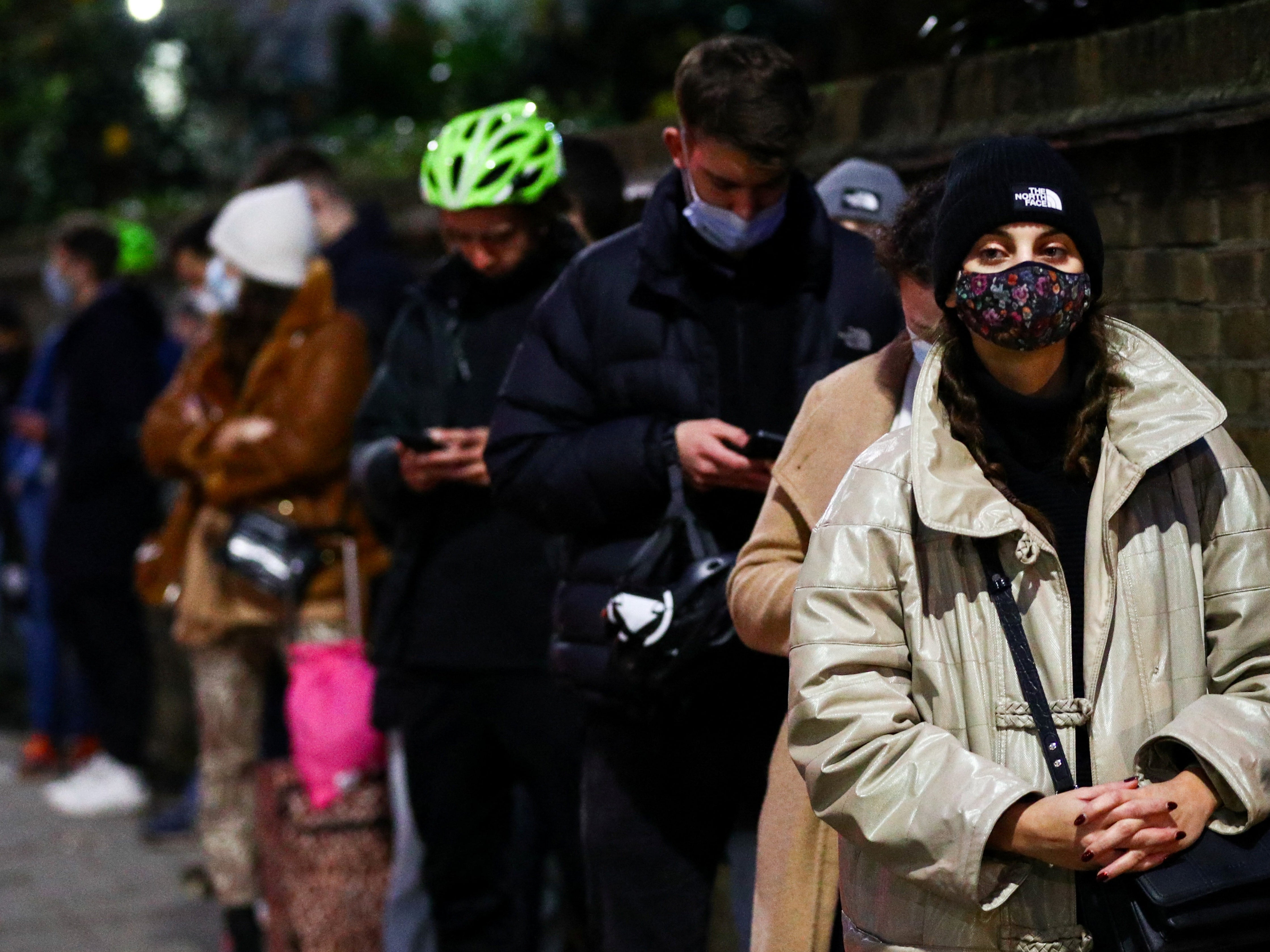Omicron infects 70 times faster but is less severe, early study says
Even if omicron is conclusively proved to be less severe, its wildfire spread can stretch and challenge health facilities around the world

Your support helps us to tell the story
From reproductive rights to climate change to Big Tech, The Independent is on the ground when the story is developing. Whether it's investigating the financials of Elon Musk's pro-Trump PAC or producing our latest documentary, 'The A Word', which shines a light on the American women fighting for reproductive rights, we know how important it is to parse out the facts from the messaging.
At such a critical moment in US history, we need reporters on the ground. Your donation allows us to keep sending journalists to speak to both sides of the story.
The Independent is trusted by Americans across the entire political spectrum. And unlike many other quality news outlets, we choose not to lock Americans out of our reporting and analysis with paywalls. We believe quality journalism should be available to everyone, paid for by those who can afford it.
Your support makes all the difference.The omicron variant infects around 70 times faster than delta and the original Covid-19 strain, though the severity of illness is likely to be much lower, according to a University of Hong Kong study that adds weight to the early on-ground observations from South African doctors.
The supercharged speed of omicron’s spread in the human bronchus was found 24 hours following infection, according to a Wednesday statement from the university.
The study, conducted by a team of researchers led by Michael Chan Chi-wai, found that the newest variant of concern replicated less efficiently -- more than 10 times lower -- in the human lung tissue than the original strain which may signal “lower severity of disease.”
The study, which suggests that omicron jumps faster from one person to another but doesn’t damage lung tissues as much as its predecessor strains did, is currently under peer review for publication in a scientific journal. Bloomberg didn’t have access to the entire study.
With scientists racing to determine how transmissible, virulent and evasive omicron is - it has already traveled to at least 77 nations within three weeks of being first detected in southern Africa - the new research out of Hong Kong may add ballast to descriptions by some physicians that most infections have so far been mostly mild and not requiring hospitalisations.
Many researchers are now watching if the most mutated coronavirus variant will crowd out other strains and pave way for the pandemic to slowly ebb away as an endemic where the world learns to live with the pathogen.
Early observations have shown that most patients don’t need oxygen or intensive treatment for the illness but many public health experts and bodies, including the World Health Organization, have urged caution. Many breakthrough and re-infection cases have been found along with infection in young people with no significant risk factors.
Professor Chris Whitty told a Downing Street press conference on Wednesday that there should be “really serious caution” over reports that a reduction in hospitalisations was being seen in cases of omicron in South Africa.
He said: “The first caution on this is simply a numerical one – if the rate of hospitalisation were to halve but you’re doubling every two days, in two days you’re back to where you were before you actually had the hospitalisation.
“If the peak of this is twice as great, then halving of the size of the hospitalisation rate, you still end up in the same place. And this peak is going very fast.”
He added: “The second point I wanted to make, which I’m not sure it’s fully been absorbed by everybody, is that the amount of immunity in South Africa for this wave – because of a prior delta wave and vaccination – is far higher than it was for their last wave. And therefore the fact that there is a lower hospitalisation rate is unsurprising.”
Prof Whitty said: “That doesn’t mean that there isn’t some degree of slightly milder disease, that is possible. But I just think there’s a danger people have over-interpreted this to say, this is not a problem and what are we worrying about?
“I want to be clear, I’m afraid this is going to be a problem. Exact proportions of it, of course, South African scientists and UK scientists and scientists globally are trying to determine at the moment.”
Countries across the world have reacted with urgency and wariness, erecting travel barriers amid widespread fears that omicron will prompt new surge in infections and add to the burden of hospitals.
Even if omicron is conclusively proved to be less severe, its wildfire spread can stretch and challenge health facilities around the world. The Hong Kong university’s study also warns against taking the new variant lightly.
“By infecting many more people, a very infectious virus may cause more severe disease and death even though the virus itself may be less pathogenic,” Chan, the study’s lead author, said in the statement.
Given that the omicron variant can partially escape immunity from vaccines and past infection, “the overall threat from omicron variant is likely to be very significant.”
Washington Post
Join our commenting forum
Join thought-provoking conversations, follow other Independent readers and see their replies
Comments